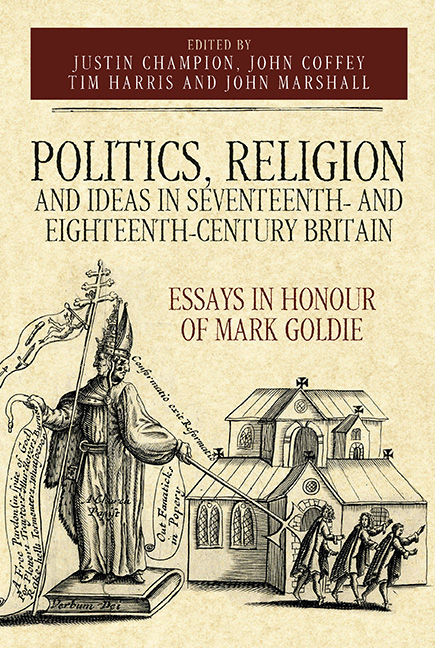 Politics, Religion and Ideas in Seventeenth- and Eighteenth-Century Britain
Politics, Religion and Ideas in Seventeenth- and Eighteenth-Century Britain Book contents
- Frontmatter
- Dedication
- Contents
- Notes on Contributors
- Acknowledgements
- Notes on Text
- Abbreviations
- Introduction: Mark Goldie – An Appreciation
- 1 Constitutional Royalism Reconsidered: Myth or Reality?
- 2 Teaching Political Thought in the Restoration Divinity Faculty: Avant-Garde Episcopacy, the Two Kingdoms and Christian Liberty
- 3 Violence, Protest and Resistance: Marvell and the Experience of Dissent after 1670
- 4 Bulstrode Whitelocke and the Limits of Puritan Politics in Restoration England
- 5 The Assassination of Archbishop Sharp: Religious Violence and Martyrdom in Restoration Scotland
- 6 Compassing Allegiance: Sir George Mackenzie and Restoration Scottish Royalism
- 7 Corruption and Regeneration in the Political Imagination of John Locke
- 8 Locke the Censor, Locke the Anti-Censor
- 9 London, Locke and 1690s Provisions for the Poor in Context: Beggars, Spinners and Slaves
- 10 The Reception of Locke's Politics: Locke in the République des Lettres
- 11 Court Culture and Godly Monarchy: Henry Purcell and Sir Charles Sedley's 1692 Birthday Ode for Mary II
- 12 Thanksgivings and the Signs of the Times: The Apocalypse in the Long Eighteenth Century
- 13 The ‘Secret Reformation‘ and the Origins of the Scottish Catholic Enlightenment
- 14 The Surprising Lineage of Useful Knowledge
- 15 The Vicissitudes of Innovation: Confessional Politics, the State and Philosophy in Early Modern England
- A Bibliography of the Writings of Mark Goldie
- Index
- Studies in Early Modern Cultural, Political and Social History
- Tabula Gratulatoria
14 - The Surprising Lineage of Useful Knowledge
Published online by Cambridge University Press: 12 October 2019
- Frontmatter
- Dedication
- Contents
- Notes on Contributors
- Acknowledgements
- Notes on Text
- Abbreviations
- Introduction: Mark Goldie – An Appreciation
- 1 Constitutional Royalism Reconsidered: Myth or Reality?
- 2 Teaching Political Thought in the Restoration Divinity Faculty: Avant-Garde Episcopacy, the Two Kingdoms and Christian Liberty
- 3 Violence, Protest and Resistance: Marvell and the Experience of Dissent after 1670
- 4 Bulstrode Whitelocke and the Limits of Puritan Politics in Restoration England
- 5 The Assassination of Archbishop Sharp: Religious Violence and Martyrdom in Restoration Scotland
- 6 Compassing Allegiance: Sir George Mackenzie and Restoration Scottish Royalism
- 7 Corruption and Regeneration in the Political Imagination of John Locke
- 8 Locke the Censor, Locke the Anti-Censor
- 9 London, Locke and 1690s Provisions for the Poor in Context: Beggars, Spinners and Slaves
- 10 The Reception of Locke's Politics: Locke in the République des Lettres
- 11 Court Culture and Godly Monarchy: Henry Purcell and Sir Charles Sedley's 1692 Birthday Ode for Mary II
- 12 Thanksgivings and the Signs of the Times: The Apocalypse in the Long Eighteenth Century
- 13 The ‘Secret Reformation‘ and the Origins of the Scottish Catholic Enlightenment
- 14 The Surprising Lineage of Useful Knowledge
- 15 The Vicissitudes of Innovation: Confessional Politics, the State and Philosophy in Early Modern England
- A Bibliography of the Writings of Mark Goldie
- Index
- Studies in Early Modern Cultural, Political and Social History
- Tabula Gratulatoria
Summary
Great citizen of Albion! thee
Heroic valour still attends
And useful science pleas'd to see
How art her studious toil extends.
Mark Akenside, Ode VIII ‘On Leaving Holland’, 1788In 1744, the physician and poet Mark Akenside (1721–70) penned an ode celebrating the British national character. Chief among the features of British life which Akenside lauded was the dedicated pursuit of useful knowledge. A practical and sensible people, the British were concerned with improving themselves and the world. The tenor of Akenside's ‘Ode’ resonated in the mid-eighteenth century, amid the proliferation of societies and clubs devoted to the improvement of various aspects of society, from agriculture to literacy. The common feature of these organisations was their focus on knowledge which was ‘useful’, in the sense that it was applied to the requirements and conveniences of daily life. Yet despite the popularity of ideas about useful knowledge in the eighteenth and early nineteenth centuries, the phenomenon remains inadequately understood. For the most part, scholars have assumed that useful knowledge developed as a feature of the popular education movements of liberal reformers. On this account, useful knowledge emerged in the nineteenth century and had little to do with religion; it was a hallmark of the secular traditions within liberal and radical politics.
This essay puts forward an alternative genealogy. I argue that useful knowledge has a much older lineage, which can be traced back to the seventeenth century. Far from having secular origins, the usefulness of knowledge arose from a concerted attempt by natural philosophers in the Baconian tradition to use the theology of Christian charity to describe natural philosophy's role in the ‘relief of mankind's estate’, as Bacon put it. In short, the new natural philosophy defined itself as a project of transforming the world, and it therefore required knowledge that was useful to improve human life. This essay traces the way that, over the course of the eighteenth century, useful knowledge underwent a secularising process. Gradually, the vocabulary of useful knowledge was separated from its theological underpinnings, and was harnessed instead to a burgeoning culture of public associations, central to which were the ideals of the public good and civic peace.
- Type
- Chapter
- Information
- Politics, Religion and Ideas in Seventeenth- and Eighteenth-Century BritainEssays in Honour of Mark Goldie, pp. 277 - 292Publisher: Boydell & BrewerPrint publication year: 2019


